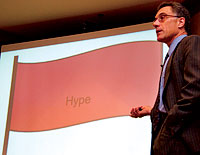In eco-friendly Asheville, you might think it would be difficult to fill a room with people who haven’t seen Al Gore’s green blockbuster An Inconvenient Truth. But visiting global-warming skeptic Marlo Lewis found it easy enough during his April 11 lecture at the Grove Park Inn.

Lewis, a senior fellow at the Competitive Enterprise Institute, a pro-business think tank in Washington, D.C., called Gore’s movie a “computer-enhanced lawyer’s brief for climate alarmism” at the event, which was hosted by the John Locke Foundation, a Raleigh-based conservative think tank.
The film has made global warming a widespread public concern, Lewis said, but the attention is hardly deserved. “Is it truly a documentary, or is it actually a scare-u-mentary, a sci-fi disaster film, in the guise of a documentary?” Lewis asked. The roughly 170 people in attendance at the luncheon/lecture, which cost $20, apparently wondered the same thing, though a show of hands indicated that few of them had actually seen the movie.
Gore’s film is one-sided, Lewis charged. For one thing, it never mentions “the ecological benefits of a carbon-dioxide-enriched atmosphere.” Lewis’ slideshow attacked various factoids and claims in the movie, illustrating his message that An Inconvenient Truth is “misleading, exaggerated, speculative and wrong.”
The movie makes the case that impoverished nations will suffer the most from climate-change impacts, a claim backed up by the findings of the Intergovernmental Panel on Climate Change. To hear Lewis tell it, Gore’s solution—cutting emissions—would do more harm. “These people desperately need fossil fuels in order to improve their lives,” Lewis said, displaying a slide of Kenya. “Much of the world is energy-starved, and yet Al Gore thinks that everyone should go on an energy diet.”
Yet, Lewis did not deny the existence of human-induced global warming, and even suggested that the Kyoto Protocol would be insufficient to avert the impacts. Therefore, Kyoto “is all cost and no benefit,” he said, and not worth signing onto.
During a question-and-answer session following the lecture, Michael Hurd of Alexander stood and asked Lewis whether he would have us “just sit back” and do nothing about climate change, given evidence that its effects are inevitable and fossil-fuel use is on the rise.
“I think we need real insurance, not phony insurance,” Lewis responded. “I think the main problem with most solutions is that they want to put the policy cart before the economic horse.”
Lewis’ organization, the Competitive Enterprise Institute, made headlines in January when ExxonMobil withdrew funding from CEI’s anti-global warming campaign, due to political pressure. Other CEI sponsors include the Alliance of Automobile Manufacturers, General Motors, the American Petroleum Institute and Arch Coal.



Before you comment
The comments section is here to provide a platform for civil dialogue on the issues we face together as a local community. Xpress is committed to offering this platform for all voices, but when the tone of the discussion gets nasty or strays off topic, we believe many people choose not to participate. Xpress editors are determined to moderate comments to ensure a constructive interchange is maintained. All comments judged not to be in keeping with the spirit of civil discourse will be removed and repeat violators will be banned. See here for our terms of service. Thank you for being part of this effort to promote respectful discussion.